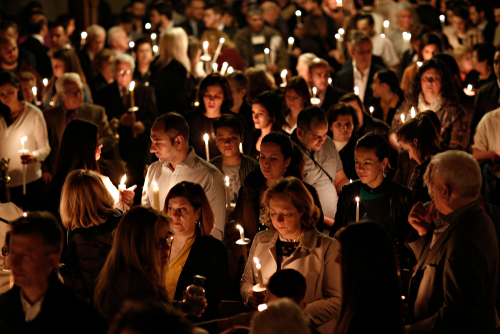“There is a longing in our hearts, O Lord, for you to reveal yourself to us. There is a longing in our hearts for love we only find in you, our God.” (Anne Quigley, 1992).
The above words, taken from the refrain of a song in the OCP Breaking Bread/Music Issue continues with verses that speak of the yearning for justice, freedom, mercy, wisdom, courage, comfort, healing, wholeness, new life. Verse four calls upon God to save us, to be light in our darkness.
Many of us today feel a darkness of one kind or another dominating our lives in places where we have previously known light, whether that be in regards to our national government, our church leadership, or in our relationships at work or at home. We seem to be living in a time when so many sins that had been hidden for a long time are being publicly revealed — sexual violence, racism, abuse of power.
What are we to do in the midst of all of this brokenness, confusion and hurt? We know that humanity has lived through dark moments before in our history. How did we find hope in the past? How do we find hope today?
Our liturgy teaches us that it is in following the pathway of our longing for God that we will find the journey of hope. It is participation in Sunday Mass that teaches us how to hold fast to the longing that is God, how to find the strength and determination to keep longing and hoping.
The writer Annie Dillard in “Holy the Firm” (Harper & Row, 1977) speaks of how we think of life today as more complicated and so unlike the Christians of the past, as though their lives were markedly different from ours:
“We are busy. So, I see now, were they. Who shall ascend into the hill of the Lord? Or who shall stand in his holy place? There is no one but us. There is no one to send, nor a clean hand, nor a pure heart on the face of the earth, nor in the earth, but only us, a generation comforting ourselves with the notion that we have come at an awkward time…our children busy and troubled, and we ourselves unfit, not yet ready…unable to seek the thread, weak, and involved. But there is no one but us. There never has been. There have been generations which remembered, and generations which forgot; there has never been a generation of whole men and women who lived well for even one day. Yet some have imagined well, with honesty and art, the detail of such a life, and have described it with such grace.”
Our liturgies are the thread by which we continue to seek and remember. In Catholic spiritual tradition, we believe that God placed the longing in our hearts; that God, indeed, IS the longing, the yearning that moves us. That yearning continually presses us towards a vision, a hope which we must not forget; which we can only imagine.
“Yet some have imagined well.” By centuries of imagining well, our liturgy and our sacraments make visible the invisible world that moves us ever forward. We come to know God through what we can imagine communion in God to be. Our ritual actions, songs and words reflect a dream well imagined, a practice or pathway beautifully shaped, by which we can journey together with God towards wholeness for ourselves and for all humanity, all creation.
Our liturgy is a centuries-old pattern of prayer and worship of God that keeps us, the Church, moving together towards the fulfillment of God’s “kingdom.” Jesus said “do this” to remember me; “do this” to remember God’s Spirit will be with you; “do this” to find your way to the light. If we celebrate the liturgy by merely following the rubrics, without understanding of the heart and soul of the ritual — in other words, without imagination — then something is missing.
The way we celebrate Sunday Mass needs to reveal and address our hunger. We are nourished together, as one body. It is a wholeness that draws us together and moves us forward. It is not just communion with God as one individual; it is communion with God in the fullness of all creation, in the oneness of all humanity. The challenge is that HOW we celebrate our liturgies can either break open or dim the light.
“Faith grows when it is well expressed. Good celebrations foster and nourish faith. Poor celebrations may weaken and destroy it.” (Music in Catholic Worship, United States Catholic Bishops, 1972). And so we pray….may the power of our liturgical participation be a light to the world.
Start your day with Always Forward, our award-winning e-newsletter. Get this smart, handpicked selection of the day’s top news, analysis, and opinion, delivered to your inbox. Sign up absolutely free today!

